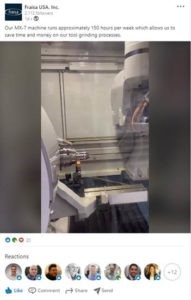By Johanna Boland, group strategy and communications manager, ANCA CNC Machines
 ANCA is a privately-owned Australian manufacturer running for more than 45 years from Melbourne and export 99 percent of its product overseas. ANCA is thriving with around 1,000 employees and is a leading manufacturer of CNC grinding machines, motion controls, sheet metal solutions and components.
ANCA is a privately-owned Australian manufacturer running for more than 45 years from Melbourne and export 99 percent of its product overseas. ANCA is thriving with around 1,000 employees and is a leading manufacturer of CNC grinding machines, motion controls, sheet metal solutions and components.
Our company has customers in over 45 countries and facilities in the UK, Germany, China, Thailand, India, Japan, Brazil and the USA as well as a network of representatives and agents worldwide.
As a business, ANCA was doing well, and by benchmark testing against our competitors we proved it met the same standards.
 We had a strong brand, advanced product management process, advertised, participated in the right exhibitions, produced good printed sales materials and had a passable website. All respectable, solid traditional marketing activities.
We had a strong brand, advanced product management process, advertised, participated in the right exhibitions, produced good printed sales materials and had a passable website. All respectable, solid traditional marketing activities.
But, it wasn’t just traditional marketing that enabled us to take the top position in our market. We make a really great product with extraordinary technology backed up by a global sales and service infrastructure. It was a positive customer experience that saw us dominate our market.
We were successful and our customers loved us – so why break what wasn’t broken? Finding my feet, I realized the potential of this opportunity.
With a more progressive marketing strategy we could offer greater customer value and stand out in our market. We wanted to be progressive in channels, but also in our approach and content.
Initially, we considered the customer experience and from reviewing social media, I got a very strong sense of the people behind the machines. The cutting tool manufacturers considered themselves craftspeople who made objects just as beautiful and refined as a guitar.
Tapping into this passion and profiling the person as well as the technology has differentiated us compared to our competitors. Telling our users’ stories has helped us better engage and inform customers.
We also looked at our channels and digital was the one to tackle first. Our website was old and clunky – but again, against our sector we were not doing badly.
 The business wasn’t shouting for a new website, but with dated architecture and visuals the site wasn’t the perfect match for our brand. We boasted technology that could grind to an accuracy of <0.002mm, yet our website was over ten years old, and looked it.
The business wasn’t shouting for a new website, but with dated architecture and visuals the site wasn’t the perfect match for our brand. We boasted technology that could grind to an accuracy of <0.002mm, yet our website was over ten years old, and looked it.
In our new website we have a careers section to highlight reasons to work for ANCA, video integration for highlighting new products, a news and media section to add value for our customers and it is integrated to our customer relationship management system (CRM) for lead generation and visibility.
Our next step will be to launch an e-commerce platform in a few months – something I am sure our competitors were not ready for and which will further help position us as a progressive business and grow revenue.
Our content marketing not only adds value to the customer but it also profiles our experienced technical experts and reinforces ANCA’s brand as the leader in its field. Social media has also provided important access to the voice of customer and our Product managers regularly use the global Cutting Tool Facebook Forum to seek customer insights and understand what the market is thinking.
We were the first in our industry to really have a go at social media and are now streaks ahead of our competition in both followers and engagement. In fact, our competitors are copying our campaigns in their own social feeds. Thankfully it is much easier to start in front than to catch up.
Posting regular content and engaging with customers’ posts has built a thriving community. We see tons of fantastic user generated content with customers sharing photos of the tools they have produced on our machines every day. Using the hashtag #MadeonANCA, we now have hundreds of mini customer testimonials that give meaningful credibility to our brand.
 Going back to the people behind the machine, we prioritised activity to improve the customer experience, rather than selling the product. Our #ToolTipTuesday series has been a hit.
Going back to the people behind the machine, we prioritised activity to improve the customer experience, rather than selling the product. Our #ToolTipTuesday series has been a hit.
We post a short informative video with tips on how to use our software. These videos have attracted almost 85,000 views on YouTube since launch. A sales person recently had a call from Boeing asking about a machine after seeing a tool tip which piqued their interest.
Given our machines can sell for hundreds of thousands of dollars, this was a cost-effective sales lead. Our #ANCAFlashBackFriday posts spark conversations about past achievements and memories to help reinforce our heritage and brand loyalty. We are also about to launch our own TV show — ANCA Academy — to host on our YouTube channel.
What I am most proud of is our Tool of the Year competition, which is now in its fourth year.
The team built a campaign that has attracted over 100 entries from Turkey, India, Italy, France, Thailand, USA, Germany, Poland, China, Russia, Japan, Korea and Malaysia. We livestream the results at the major trade fair of the year and gain significant media coverage to boost our customers’ brands.
Last year there were almost 30 entries received from across the world, achieving 70 media appearances seen by over 80,000 fans and generating over 200,000 engagements on social media.
Awards are not a new concept, but this format was for our industry, especially using social media as part of the campaign. We use our Facebook channel for the community to like the entries and select the finalists, helping grow our own Facebook page and reach a broader audience.
We found an influencer, Alfred Lyon, and asked him to be a judge. Alfred is a customer in the USA who has over 45 thousand followers on Instagram – and I don’t imagine that many people would bother to follow if they weren’t interested in content featuring cutting tools.
At a trade show in Germany when we announced the winner on the stand a customer came up to me and thanked me for giving their industry a platform to be recognised.
Four years into working for ANCA I have seen the value of thinking creatively and bringing new and different ways of building your brand to a business. Traditional marketing remains fundamental, but building a personality around our product, telling a story and considering the person behind the machine has helped us gain a more vibrant and open reputation.
Related Glossary Terms
- computer numerical control ( CNC)
computer numerical control ( CNC)
Microprocessor-based controller dedicated to a machine tool that permits the creation or modification of parts. Programmed numerical control activates the machine’s servos and spindle drives and controls the various machining operations. See DNC, direct numerical control; NC, numerical control.
- grinding
grinding
Machining operation in which material is removed from the workpiece by a powered abrasive wheel, stone, belt, paste, sheet, compound, slurry, etc. Takes various forms: surface grinding (creates flat and/or squared surfaces); cylindrical grinding (for external cylindrical and tapered shapes, fillets, undercuts, etc.); centerless grinding; chamfering; thread and form grinding; tool and cutter grinding; offhand grinding; lapping and polishing (grinding with extremely fine grits to create ultrasmooth surfaces); honing; and disc grinding.
- profiling
profiling
Machining vertical edges of workpieces having irregular contours; normally performed with an endmill in a vertical spindle on a milling machine or with a profiler, following a pattern. See mill, milling machine.
- sawing machine ( saw)
sawing machine ( saw)
Machine designed to use a serrated-tooth blade to cut metal or other material. Comes in a wide variety of styles but takes one of four basic forms: hacksaw (a simple, rugged machine that uses a reciprocating motion to part metal or other material); cold or circular saw (powers a circular blade that cuts structural materials); bandsaw (runs an endless band; the two basic types are cutoff and contour band machines, which cut intricate contours and shapes); and abrasive cutoff saw (similar in appearance to the cold saw, but uses an abrasive disc that rotates at high speeds rather than a blade with serrated teeth).
- tapping
tapping
Machining operation in which a tap, with teeth on its periphery, cuts internal threads in a predrilled hole having a smaller diameter than the tap diameter. Threads are formed by a combined rotary and axial-relative motion between tap and workpiece. See tap.

 INDUSTRY NEWS
INDUSTRY NEWS

